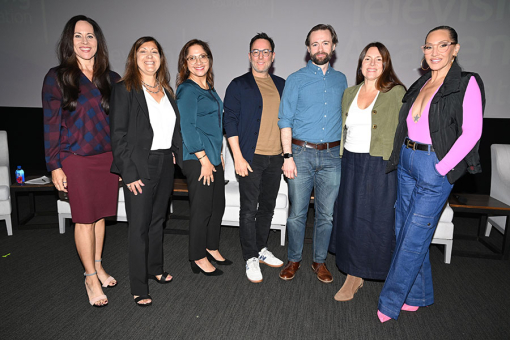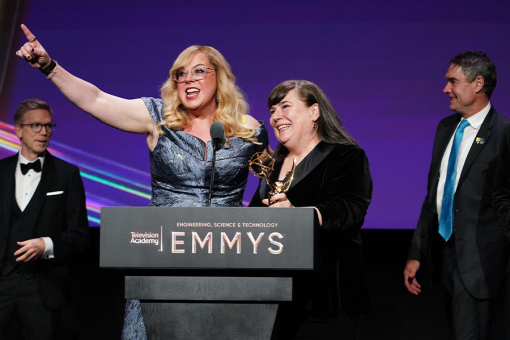Television is an ecosystem, metaphorically speaking: some species thrive and others die, amid a constant evolution.
That characterization of the medium impressed Kristine Weatherston, an assistant professor in the Department of Media Studies and Production at Temple University in Philadelphia, when she heard it from a speaker at the Television Academy Foundation's twenty-sixth annual Faculty Seminar. "I can't wait to tell my students," she said. "What a great way to talk to them about television."
Imparting lessons learned from television pros is a key purpose of the seminar, which invites twenty professors from colleges around the nation to experience an insider's view of the industry.
The gathering, held November 11–15 primarily at Academy headquarters in the NoHo Arts District, also featured panels on topics such as network programming, television movies, securing rights, reality storytelling, television directing, below-the-line jobs and budgeting and scheduling as well as field trips to Warner Bros. Studios, Stargate Studios and The Arsenio Hall Show.
Another highlight: a ninety-minute session with showrunner Jason Katims (NBC's Parenthood, Friday Night Lights), who discussed his career with Karen Herman, vice-president of the foundation's Archive of American Television. Formerly a struggling playwright, Katims got his television start in 1994 when a ten-minute play he'd written was noticed by Ed Zwick, co-creator of thirtysomething and, at the time, an executive producer of My So-Called Life, a teen drama starring Claire Danes. Zwick called Katims with an offer to write for the show.
My So-Called Life was his "grad school," Katims said, where he learned from Zwick and his producing partner, Marshall Herskovitz. "They have a very specific approach to storytelling — the attention to minutia, to nuance. It created my approach to what I do today. I was lucky I landed in a place where they considered television a sea of potential — as a series, episode by episode, they had enormous ambitions for it."
Katims won a Primetime Emmy in 2011 for outstanding writing for a drama series for Friday Night Lights, the 2006–11 series about high-school football in a small Texas town that he developed from the feature film and executive produced. The show began its run on NBC and then was picked up by DirecTV.
The pilot had already been filmed when Katims was asked to take over. He was impressed by the sense of place evoked by location filming and the stories to be mined from a key plot point: the star quarterback is paralyzed after a game injury. The series, like the pilot, was shot with hand-held cameras.
"We never rehearsed scenes — we shot rehearsals," he recalled. "We never built a set. I felt it crucial for this show that everything felt real. The process was so fluid. Actors, with the help of directors, figured out [movements]. They never laid down a mark. There was a lot of shooting through windows and doors. The actors would refer to the camera operators as 'snipers' because they didn't know where they were. They weren't acting for the cameras, but with the other actors. Real things happened. And all the actors in the scene had to be there — there was no [camera-angle] coverage."
For the multi-generational Parenthood — also based on a feature and now in its fifth season — Katims again seeks "that feeling of life as it is happening, but not as cinema vérité. I loved, with Friday Night Lights, the idea of the large ensemble, of having numerous storylines going on at once. I liked the idea of doing the story of this big, messy family."
Katims didn't have storylines plotted out after the Parenthood pilot. "One of the joys of the process is working with writers in the writers' room," he said.
More joys: working with the actors and making discoveries during editing. "You see what comes back in the cut, things you didn't expect, that they're bringing to it, and you write to that."
For example, what was intended as a short relationship between teen Amber Holt and returning Afghanistan vet Ryan York instead has become a long-term story arc, powerfully exploring the issue of PTSD. This was brought about, he said, by the "incredible chemistry" between actors Mae Whitman and Matt Lauria.
While some showrunners have had famously contentious relationships with their networks, Katims believes in working with the network from a project's earliest stages, and, he said, "flooding them with material. The single goal I have as a showrunner, from a managerial standpoint, is clarity. When television can get bad is when the network says one thing, the showrunner another, and the actor another." He listens to network notes without becoming defensive, stores the feedback and lets adjustments emerge organically.
For his upcoming series About a Boy, based on the film of the same name, Katims met with NBC Entertainment chairman Bob Greenblatt and brought all his stories along. "You want to build up a trust with [network executives]," he said. "They understand the business in a way you don't. They certainly know more about selling shows and marketing and promoting them."
For assistant professor Weatherston, Katims's devotion to storytelling also made a deep impression. "I loved hearing him talk about story," she said. "It's the most important thing, what people are drawn to. He boiled that down to his ten-minute [play]. I loved that philosophy — if you can do it in ten minutes, you can do anything."
For colleague Moses Alexander Greene, an assistant professor of film and interactive media at Saint Augustine's University, a historically black college in Raleigh, North Carolina, the Faculty Seminar experience meant that, "We've now entered the frame. We're no longer in the book, teaching it," he said. "We're in the television world, and then we get to go back and invite our scholars to go deeper into that world. It's a once-in-a-lifetime opportunity that raises the bar for the kind of professor I am, and the kind of scholars that can enter the industry. This gives me the tools I need to make them competitive."
And for Sharon Shahaf, an assistant professor for television studies and global media at Georgia State University in Atlanta, the seminar was "incredible. I thought I knew what Los Angeles was about" — having attended other industry programs — "and I had no idea," she said. "Everyone is letting you see their work process. You get a sense of how hard these people work — everyone seemed in the midst of an eighteen-hour day. We were all impressed by that. You don't expect that level of commitment."
Shahaf also appreciated learning how the pros got their first industry jobs — information her students want to know. And she was pleased that she can now cite influential sources as she encourages her students to become better communicators, a necessity in storytelling. "I've learned how to market to my students," she said. "I now have a concrete framework to say it."
College Profs' TV Confidential
In-depth conversation with showrunner Jason Katims is among the highlights of annual seminar.










